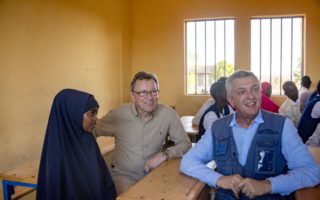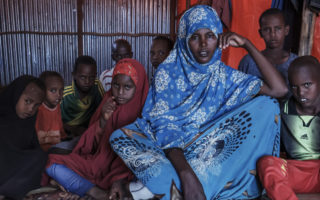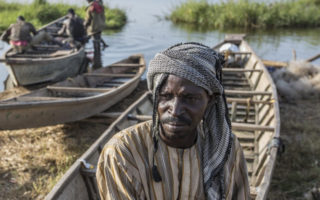
Yemeni refugee Hanan and her Ethiopian friend Yanchinew (centre) prepare food as part of a cooking course at Nefas Silk Polytechnic College in Addis Ababa, Ethiopia.
© UNHCR/Eduardo Soteras Jalil
A vocational programme funded by the German government teaches skills such as cooking, woodworking and mechanics to refugees and their hosts.
All morning, Hanan Seif Hassan, a 32-year-old refugee from Yemen, and her friends have been chopping onions, peeling carrots, boiling lentils, cooking rice and preparing samosas – to sell as popular snacks.
The women became friends while attending a vocational training course at Addis Ababa’s Nefas Silk Polytechnic College, the first of its kind in Ethiopia where refugees and Ethiopians can together study subjects ranging from cooking and woodworking to mechanics.
Hanan was not sure what to expect at first. She worried about fitting in as a mature student and a refugee. Her concerns evaporated once she got to know her classmates, including her Ethiopian best friend, Yanchinew Gebeyehu, 26.
“We are very close and help each other in our studies,” says Hanan. “Whenever something isn’t clear, someone else in the group always explains.”
Spending time with her Ethiopian peers has also helped Hanan forge a deeper understanding and appreciation of her new home.
“We learn about the language, culture and way of life from our classmates. It has changed our way of thinking about life also,” she adds.
Yanchinew also treasures the friendships she has made at college.
“We don’t have special treatment for the refugees … we treat them as citizens.”
“Hanan is a good person. She’s humble. She tells me what she’s feeling inside and we’re very close, like sisters. I’ve learnt a lot from her,” she says.
The initiative at Nefas Silk College is part of the Qualifications and Employment Perspectives for Refugees and Host Communities Programme (QEP), commissioned by the German Federal Ministry for Economic Cooperation and Development (BMZ) and implemented by GIZ, the German development agency. It improves employment prospects in Ethiopia for both refugees and Ethiopians alike.
Melese Yigzaw, dean of the college explains that it is vital that refugees and Ethiopians are given the same opportunities to prepare for the job market.
“The aim of this integrated training is employment. We don’t have special treatment for the refugees … we treat them as citizens,” he says.
The dean adds that allowing refugees to work is key so that they can thrive while they are in exile and contribute to the economy of their own countries when it is safe for them to return.
“If someone is skilled and can change the gears of a vehicle or cook, they can generate income. If you train them, they can create jobs wherever they go, even when they return to their home,” he adds.
Ethiopia hosts one of the largest number of refugee populations in Africa. Most of them come from South Sudan, Somalia, Eritrea, Sudan and Yemen.
In January 2019, the country passed a historic new refugee law. Considered among the most progressive refugee policies anywhere in the world, the Refugee Proclamation gives refugees the right to obtain work permits, access primary education, legally register births and marriages and access financial services, such as banking.
“Nefas Silk Vocational College is an example of how inclusion of refugees in the vocational training system of Ethiopia can work. The new law paved the way towards making this pilot happen,” says Tobias Erbert, GIZ Programme Coordinator, Qualifications and Employment Perspectives for Refugees and Host Communities Programme.
The initiative has also allowed teachers to receive additional training and students to benefit from the training offered by companies in the hospitality and transport sectors. GIZ also plans to support the college in establishing an entrepreneurship centre to help upcoming start-ups.
As part of its strategy, GIZ organized a competition to encourage groups of refugees and Ethiopians to pitch business ideas to a panel of judges from the college and the business world. With their proposal for a samosa business, Hanan and her friends were one of two winning groups who will now receive mentoring from a business coach to develop their business plan.
“Our experience of supporting entrepreneurship in Ethiopia is that teaching people just to write a business plan is not enough. What is crucial is that entrepreneurs are given ongoing support and advice,” adds Erbert.
Such strategic partnerships between UNHCR, the UN Refugee Agency, the private sector and development partners is illustrative of how a smarter, more comprehensive approach to refugee situations can help ease the burden of hosting refugees for host communities, boost refugee self-reliance and increase opportunities for resettlement.
“Here we are free, we can move, we can think independently. I feel free like a bird in Addis.”
Education and access to safe, decent work are topics under discussion at the Global Refugee Forum a high-level meeting to be held in Geneva later this year. States, the private sector and other actors will announce high-impact contributions that will give refugees a chance to use and further develop their skills and contribute to economic growth in their host communities.
For Hanan, Ethiopia has offered her opportunities that she would never dare dream of back home.
“In Yemen, we cannot go to school like this or go out by ourselves. Here we are free, we can move, we can think independently. I feel free like a bird in Addis,” she said.
Originally published on UNHCR on 29 October 2019





